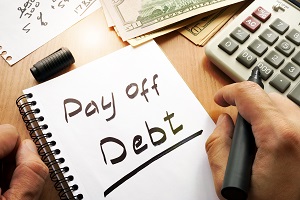
Your bills are past due, you’ve fallen behind on your house and car payments, and you don’t see how you’ll ever be able to recover. Have you given bankruptcy any thought? It could be a way to make a fresh start. But you have a huge pile of bills, and it seems as though you will never be able to pay them off.
Are your debts too high for you to declare bankruptcy? Find out by reading on.
Debt Limit in Chapter 13 Bankruptcy vs. No Limit in Chapter 7
In a Chapter 13 filing, you’ll work with your lawyer and the court to develop a three- to a five-year repayment plan for your debts. You can maintain your secured creditors, such as your mortgage, by paying them either directly or through the bankruptcy and only pay what’s required by the court for your general, unsecured debt. At the end of five years, any eligible unpaid unsecured debt will be discharged.
Besides your income and expenses, another qualifying factor in whether you can file a Chapter 13 is the debt limit amount set by the court. If you owe more than this limit, you may need to consider a Chapter 11 filing instead. While the debt limit for Chapter 13 was previously $1,395,875.00 for secured debts (mortgages, auto loans, etc.) and $465,275.00 for unsecured debts (medical bills, credit card debts, etc.), the good news is that these numbers have recently been revised to an aggregated total of 2.75 million for all debts, meaning that more individuals are able to qualify for Chapter 13 filing than ever before.
Is There a Maximum Debt Amount for Chapter 7 Bankruptcy, also?
The maximum amount of debt you can have when filing for Chapter 7 bankruptcy is unlimited. Because Chapter 7 eliminates debt and doesn’t require repayment, the court does not consider how much debt you owe when determining if you are able to file.
There is no debt limit, but income may be an issue.
While the amount of debt you have will not affect your Chapter 7 eligibility, it is determined by other income guidelines. Please see this post for a more detailed discussion of Chapter 7 bankruptcy eligibility in California, but we can summarize as follows:
Under intense pressure from the credit card industry, Congress passed bankruptcy reform in 2005, with the goal of making it more difficult for consumers to file for Chapter 7 bankruptcy and discharge all of their credit card debt. To automatically qualify, the debtor must have earned less than a California family of the same size in the previous six months. If the debtor earns more, they must meet the means test before filing for Chapter 7. The means test subtracts your expenses from your income to determine whether you can afford a Chapter 13 plan. You will not be eligible for Chapter 7 if you have enough disposable income.
For some debtors, the issue with Chapter 7 isn’t so much debt as it is too much income.
Want assistance with your bankruptcy?
If you reside in California and are having financial difficulties, think about declaring bankruptcy. To put it mildly, it can be a challenging process, so you’ll want to be sure you have an experienced bankruptcy lawyer on your side to support you in obtaining a discharge. At Winterbotham Parham Teeple, a PC, we have knowledge of debt settlement, student loans, and Chapter 7 and Chapter 13 bankruptcy. Don’t wait; get in touch with us immediately for a free debt assessment and start down the path to recovery. Call 800.400.9000.



